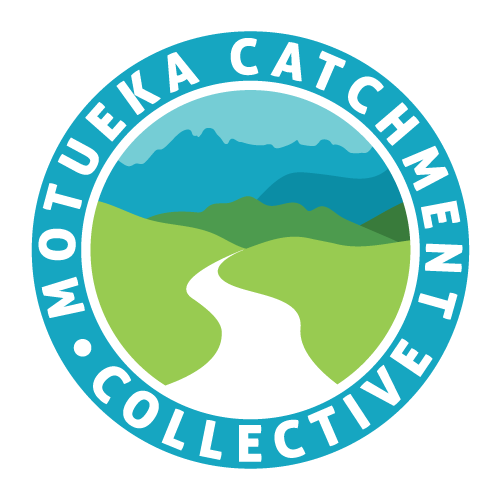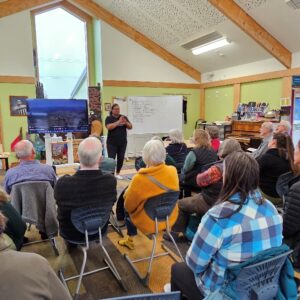An inspiring and uplifting Sunday session at Te Whare Taikura ō Te Maatu
Around 35 people from the community gave up a fair chunk of their Sunday to attend MCC’s Living River event on July 28th at Te Whare Taikura ō te Maatu. There was a great mix of people attending, including people actively looking after rivers in their sub-catchments, Tasman Bay Guardians and Tasman District Council staff, and others from across the Motueka catchment and beyond.
Dayveen Stephens, Pou Taiao (Environmental Manager at Ngāti Tama) spoke eloquently of the whakapapa of Ngāti Tama people to the river, and the history of occupation along the Motueka River back to the 1830’s, right up to its source “Ki uta ki tai” – from the mountains to the sea; of Ngāti Tama pā sites, wahi tapu and mahinga kai sites, and of the path and places traversed all around Te Tau Ihu by their ancestors. Dayveen spoke of Huriawa, the taniwha that ducked in and out of the aquifers. This is the connection Ngāti Tama people have to the Motueka awa.
She also spoke of Te Mana ō te Wai – how it is a national initiative where iwi and councils come together and try and come up with shared values and priorities for all of the waterways of the Top of the South. Iwi talk about what they want embedded in the freshwater plans and statements. This includes what will improve our awa. Some priorities she raised include:
- wanting clean, freshwater that is safe to drink
- being able to access our mahinga kai and wahi tapu areas, which are often on private land. She spoke of the reduction in the numbers of fish in the rivers from what used to be there that their ancestors had access to.
- ensuring the land is good and the awa meanders through freely to the sea and maintains itself and the banks and riparian areas are supportive of the wai.
- protecting taonga species and ensuring their is care and respect of special places and species.
She talked about us all being here for the same reasons “to look after and take care of the water”.
David Young then spoke of his book Wai Pasifica and more widely of how we might take a different approach to valuing and looking after our freshwater.
- The need for a circular economy where no waste is created
- A reciprocal relationship with the land, a place where we approach with reverence and respect.
- The need to update the Water Conservation Order to go beyond the protection of the Motueka River for trout fishing and aesthetic landscape values, but to also include spiritual values by Māori.
- We can’t go on treating the land and water as we are
- The beauty of the Whio (blue duck) and how wonderful it would be to have whio throughout our rivers, who only live in the most pure rivers – aim for high water purity.
- To plant prolifically along the banks of rivers to help shade them and protect them from contaminants and create habitat for fish and birds.
- The use of rāhui for protecting rivers and people
To read more about David’s book Wai Pasifica go here – http://www.davidyoungwriter.com/

Following the speakers, there was discussion in smaller groups about how to better integrate indigenous perspectives into the MCC’s mahi in the catchment, and what people would like to see in the Motueka catchment into the future. Everyone who attended seemed to be on a similar wavelength in terms of what they’d like to see including:
- More love and connection for the river and more respect and understanding of its value
- Considerably more riparian planting and for that planting to extend across the whenua, not just to be a narrow strip
- The river to return to as close to its natural state as possible, including to allow it to flow more freely and not be channelled, but recognising the impact that has on landowners along the river
- More protection for a wider range of values than those covered in the current Water Conservation Order and for this to extend further up the river into the upper catchment.
- More attention given to maintaining ecological flows, and consideration to which types of land uses should be given water take rights and managing water takes more carefully.
- More education and awareness for the whole community to realise the importance and value of our rivers
- More ways for people to access to and enjoy being on and near the river
David commented:
“What a special group of people! Thank you so much for the invitation. It was great to be a part, for a few hours, of your impressive organisation. So good to see the word ‘catchment’ gaining traction again.”
Cheryl from the Baton Valley commented that:
“I’m so glad I came along. The event was inspiring, the speakers were great and it was lovely to spend time with other people who care about our rivers”.
The MCC looks forward to more events like this where we explore ways of better protecting and looking after the rivers in our catchment, working together, and bringing in multiple perspectives, including Te Mana ō te Wai and indigenous approaches.


